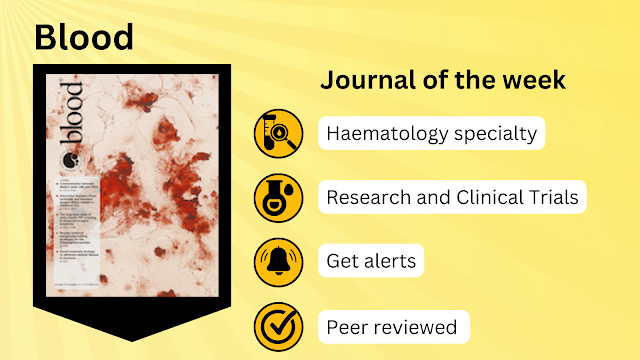Blood
Blood is published by the American
Society of Hematology, covering content such as blood diseases, and “basic
laboratory, translational and clinical investigations in haematology”. It is a
specialist journal which will be useful to clinical scientists. Research articles are published under
the following categories:
- Clinical Trials and Observations
- Gene Therapy
- Hematopoiesis and Stem Cells
- Immunobiology and Immunotherapy
- Myeloid Neoplasia
- Lymphoid Neoplasia
- Phagocytes, Granulocytes and Myelopoiesis
- Platelets and Thrombopoiesis
- Red Cells, Iron and Erythropoiesis
- Thrombosis and Hemostasis
- Transfusion Medicine
- Transplantation
- Vascular Biology
This journal is in the top 3 list of impactful journals for this topic category (haematology), as determined by the journal impact factor (2024, Journal Citation Report, Web of Science, accessed 29/01/24).
Journal Impact Factor (JIF)
The Journal Impact Factor (JIF) is the most widely quoted metric and has traditionally been the gold standard. It gives an overall value indicating the average number of times research articles and reviews have been cited by other articles/journals. Typically, it has been an indicator of the impact and influence of a journal on published research in a subject category. However, it is not necessarily an indicator of quality and there is some debate these days regarding its value. You can find the JIF of a journal by typing “impact factor” along with the journal name into Google. I have used Web of Science to find information about the JIF.
View this journal now:
- On Browzine [UHNM users]
- On Library Search [Keele users, limited holdings]
The journals available to our different user groups may vary. Please check your journals collection for access.
If you like that, you might like this…
- Best Practice & Research: Clinical Haematology
- Blood Advances
- Blood Research
- Blood Reviews
- Critical Reviews in Oncology and Hematology
- Hematology/Oncology and Stem Cell Therapy
- Hematology/Oncology Clinics of North America
- Lancet Haematology
- Seminars in Hematology
For more journals see our Journal of the Week blog posts.
Stay uptodate with the latest articles from this journal
Sign-up to the eToCs – electronic table
of contents – to get the table of contents for the latest issue sent to your
inbox. Read our blog posts about etocs for more information.
If you receive KnowledgeShare Evidence Updates ask whether the etoc for a journal you want can be added to your update.
Finding Journals
Check our journals lists to look for
journal titles:
Keele access to full-text
Keele staff and students access full-text journals by logging in with their Keele MS 365 login [email address and password]
NHS access to full-text
NHS users need to register for an NHS OpenAthens username to access full-text for this journal – complete the online form or follow these instructions for more help.
Need more help?
Contact the Health Library for help accessing resources or finding
information
Contact the eresources librarian to report a problem with any journal or
for help setting up your NHS OpenAthens username

Comments
Post a Comment